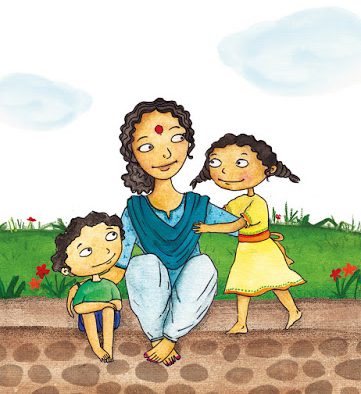Why I Teach My Foreign-born Indian Children Malayalam?

winters, the food from my favorite Indian restaurant in the city seemed to warm
me up through its thin packaging.
find her brother.
passports and therefore citizenships, they are third culture kids, in every sense
of the term. We have lived in San Salvador, Manila and now, Budapest and they
have spent only a few months of their lives back home in Kerala, where I’m from.
Like most of the expatriate children they are surrounded by, their lingua Franca,
is English. This was in no way by design.
later developed into full fledged love and I wrote about it here on the occasion on
International Mother Language Day, last year. So, making sure that my children
spoke in my mother tongue, the language of their mother and their father, was
truly important to me. When my daughter was born in 2011, the only language I
used to talk to her in was Malayalam. Having moved to El Salvador when she was
just 5 months old meant the only other language she heard around her was
Spanish, which we were not very fluent in. And so by the time she turned two,
she was equipped with a rather solid vocabulary of Malayalam words and
rhymes and she could even sing the first few verses of the Malayalam songs of
my childhood.
with their usual patronizing “Kuttiku Malayalam ariyummo? Does the child know
Malayalam?” I would hold my head high and respond with a bright smile.
somehow slipped into speaking English around 80% of the time. It was what was
most convenient and my husband’s family with an army background too spoke to
each other in English as did he, most of the time. We had no Malayali friends and
we figured English would help her in school and there was no harm. As time
passed, I realized that English had become the only language she used, with her
Malayalam conversations limited to me or at the times I reminded my parents to
talk to her in Malayalam when they called.
Malayalam rhymes and lullabies that I had sung to her in her toddlerhood. She
watched with mild amusement and curiosity as I dusted those age-old songs out
from the crevices of my memory where I had shoved them in, as she grew too old
for them. She tried to sing along with me and smiled as I told her that these songs
belonged to her too. My son, however in typical second child fashion threw a deaf
ear to my croonings and decided that whatever his elder sibling did must be his
gospel. His first words were indeed Amma and Dada and his favourite animal for
the longest time was “Aana” or the elephant, but the rest of his speech was in
English. And though both my children understand Malayalam completely, even to
the point of picking up song lyrics, their preferred language of speech is English.
Budapest, last year most people were amazed at how well they could
communicate with my children thanks to their fluency in English.
one, I never consciously taught them English, they picked it up on the go, by
merely listening, the way I picked up Malayalam. And I felt guilty that I had not
been able to pass on my mother tongue to them, in the same way.
global language. It is not even the national language of India. As Indian languages
go, won’t it make more sense for them to learn Hindi?
to fall in love with Malayalam the way I did. I want them to have more than
functional literacy. I want them to be able to read it and write it and get the ins
and outs and the nuances of my gracefully curvy mother tongue.
Aadu in all its natural glory?
for? The kind that can never ever be translated?
ply badly made Malayalam cartoons at them. I read them the wonderful “Unni
Kuttande Lokam” and other Malayalam children’s books. I tell them that
Malayalam is our secret code language and that everyone knows English, but
only us Malayalis know Malayalam, making it special. And I keep at it.
 |
| Illustration : Tanvi Choudhury |
For that’s what most mothers are as far as their children are concerned,
irrational and emotional, yet wanting to them to get the best of what the world
has to offer. And to me, our mother tongue Malayalam will be their key to a
world filled with literary riches and wit beyond compare and one of the greatest
legacies that I can bequeath them with. And maybe someday, when I’m far gone
and they are grown up, it will be the lilt of this very mother language that will
evoke in them the memories of my irrational, emotional love for them, a love that
will always live on.
of ‘Coming Up On The Show’ and ‘Between The Headlines’, two novels on the Indian
Broadcast News Industry. Her last worldwide release ‘A Newlywed’s Adventures in
Married Land,’ a modern take on Alice In Wonderland got rave reviews from critics and
readers alike and has been consistently ranked high in Amazon India’s 100 bestsellers in
Indian writing list. Her travel columns have been featured in Travel and Flavours,
Venture, The New Indian Express, One Philippines and Geo. Her non-fiction pieces have
appeared in multiple Indian editions of the Chicken Soup series. Her short fiction and
poetry have been published in more than twenty anthologies and online literary
magazines in more than four continents.
inspiring mothers one day at a time, featuring real life stories on honest parenting and
interviews with inspirational mothers and grandmothers. Shweta currently lives in
Hungary with her two children and husband. You can read more about her life and work
at www.shwetaganeshkumar.com)








